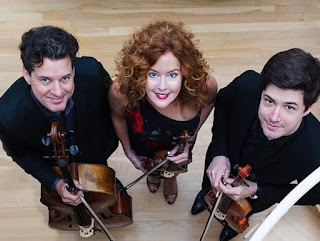String trio brings out French works written between the world wars
With only a spotty knowledge of French and seeing the title of a brilliant new Cedille release, my mind
 | |
| BOE: David Cunliffe, Desirée Ruhstrat, Aurélian Fort Pederzoli. |
went immediately to the most familiar musical use of the word "orage" (storm). The original second act of "Les Troyens" by Hector Berlioz depicts the royal hunt and storm at the center point of the drama, and exemplifies the rare but significant extremes French romanticism was sometimes capable of.
The Black Oak Ensemble's "Avant l'orage: French String Trios 1926-1939" hints at the storm of the Second World War that was to sap French cultural and political confidence for the second time in the 20th century's first half. But unlike the flamboyance Berlioz and others brought to French music in the previous century, the composers represented here express a search for balance, a measured sense of small-scale expressiveness and upholding the traditional French virtue of clarté — a word whose English approximations offer so many ways of illuminating the bright side of the spectrum that it would be pedantic to list them here.
The original plans for depicting Aeneas and the soon to be betrayed Queen Dido enjoying the pleasures of the hunt had to be discarded; it would not do (as the production intended) to divert the waters of the Seine for a scenic spectacular, it turned out. The music remains worth hearing as an orchestral showcase; the lengthy opera itself is rarely done because of the aesthetic and vocal demands that remain.
It's a pleasure to set aside such thoughts to revel in the modesty and more effectively controlled emotion and technical means of seven distinctive composers: Henri Tomasi, Jean Cras, Emile Goué, Jean Françaix, Robert Casadesus, Gustave Samazeuilh, and Gabriel Pierné. The storm to come in 1939 lay outside the realm of art, and would be so much more capable of overshadowing it, of course.
Two familiar names — the prolific Françaix and the concert pianist Casadesus — seem good places to start: Francaix's easy command of a neo-classical style shows energy and wit. His Trio's first movement (Allegretto vivo) justifies its abrupt ending after a full-energy display. The scherzo is fresh and rhythmically alert in the Black Oak Ensemble's performance. The Andante is sentimental but engaging because the mood is not overdone. The finale ends gently after its distinctive, hard-driving assurance that somber messaging is never the point.
Casadesus' Trio a cordes displays the ensemble's gift for hanging together with communicative purpose. That prevails after an initial outburst that sends violin, viola, and cello off in different directions. The muted, vibratoless "Legende" has a modernist aloofness without following any dogmatic assertions of the need to sound different. Allegro aperto, the finale, carries in its movement heading a word rarely encountered, but recalling a similar description at the top of the first movement of Mozart's best-known violin concerto; "Open" is how "aperto" can be translated, and Casadesus' bold unanimity of attack and feeling holds sway, wiping away the attractive mists of the "Legende."
Of the other trios, Tomasi's stood out to me for its "Nocturne" movement, restful despite its purposely meandering harmonies. The finale has that debonair self-confidence one expects from French music. And I need to mention Emil Goué's Trio for its adventurous Final en forme de tarantelle, which gets a well-defined performance steering with aplomb over shifting harmonic terrain.
All the music deserves revival, in part because of the optimism of the disc's title: If there are storms to come, it may help to savor music that comes out of a bubble of relative calm, promising relief in the long term, as long as there are musicians like the Black Oak Ensemble to advocate for it. Clarté is always a welcome ingredient in recipes for repasts that last. The culinary skills in "Avant l'orage" are of the highest order.



Comments
Post a Comment